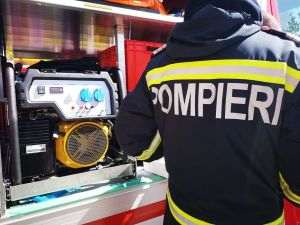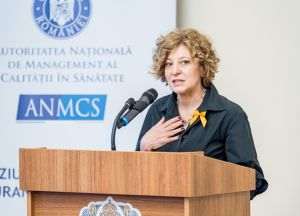"We no longer have the limit of 3% budget deficit, but there is a natural limit to the loans that Romania can access - financing the deficit won't be easy", Popa says
• Cristian Popa: "The NBR is monitoring the liquidity in the market and is taking steps to ensure it is adequate, to prevent a deficit, for sufficient liquidity to exist"
Everyone should be aware that, although the 3% budget deficit limit no longer applies, there is still a natural limit on the amounts that Romania can access, which means that caution is needed because financing the deficit will not be easy, said Cristian Popa, member of the Board of Directors of the National Bank of Romania (BNR).
He said: "The challenges, of course, are many, we all know them, from operations to many more complicated situations, but I would focus on one, namely the public deficit and its financing. Here we must sound the alarm, Of course, we no longer have the 3% budget deficit limit imposed by the European Commission, but there is a natural limit on the loan amounts that Romania can access and I think we need to be aware of this. Unlimited money doesn't exist. "I think we need to be balanced, I don't think it will be easy to finance the deficit."
Cristian Popa stressed that investors will not finance an out-of-control deficit and Romania could have issues borrowing "if it overdoes it".
"If measures that have a negative impact on the economy are taken, it will be harder for us to attract investors. They will not finance an out-of-control deficit, in my opinion. It must also be said that the fiscal room to maneuver was already small, it is no secret that expansionary fiscal policies in recent years have consumed much of the possible, potential resources to attract before the pandemic strikes, so the ability to fund all projects required by the private sector and the population is limited, and I would stress the word "limited". The state cannot borrow without a limit. We may have problems when it comes to funding the deficit if we overdo it. I come from the private sector, I am telling you, and I will repeat this message: there is a limit past which lenders no longer lend to you, or if they do, they do so at high costs. It gets difficult to borrow and you will probably borrow at higher costs", he said. He also noting that the public debt in relation to the size of GDP is expected to pass the 50% threshold in 2021 given that it was at 35% in 2019.
Banking analysts and those of the rating firms, as well as the specialists of the Romanian Fiscal Council, pointed out that the big problem for the Romanian budget and the sovereign rating - implicitly the financing of the budget deficit - is the implementation of the 40% pension hike from September, a hike which implies a significant budget effort not only this year but especially in the coming years.
Popa also pointed out himself that the budget has a structural problem, as the public deficit is estimated by analysts to be between 7% and 9% of the GDP for 2020 and by the European Commission to over 9% this year and over 11% of the GDP in 2021.
"Of these figures, about 2-3% are stimuli to fight the crisis, the rest is a structural deficit that is not related to the pandemic. I think we need to be mindful of these figures, 6.7% is the structural deficit that the Commission expects this year and 9.2% next year. I think that is the main challenge", the NBR official noted.
He added: "Although fiscal rules have been temporarily suspended, filling such a need for financing poses great challenges for Romania. They stem from the limited absorption capacity of the internal market, external market uncertainties, the cost of financing, the possible deterioration of the sovereign rating, all of us already know that we are on the edge of the "investment grade" rating. If I were to sum everything up in one word, I would use the word 'caution,'" Popa said.
• Popa: "Whoever says that the NBR hasn't done enough is wrong, the outcome of the decisions of the NBR is good"
The NBR official noted that there are indeed many challenges, but there are also opportunities for the banking sector and the increase of financial intermediation.
"I strongly believe that this time, banks are part of the solution, not the problem, as they were a decade ago. From the point of view of the financial system at the moment things are rather the opposite of what they were like in 2009-2010, and that is important in terms of opportunities. We are looking at a very solid banking system, which is very important from my point of view. Of course, there are challenges that need to be overcome, but we will get over them fine. The banking system is in a very good position to transfer the monetary policy of the National Bank of Romania, I call it the "gearbox", because that is what it is, it transfers the liquidity and the cost of financing and effectively the decisions that the NBR makes, propagates them into the real economy and it is very important for it to be healthy during this period. Commercial banks finance the real economy, are helped by the liquidity that the NBR creates and by low interest rates, they are a very important part of the system", Cristian Popa explained.
He noted that a lot more of professionalism is needed at the central bank as well and said that the results of the decisions made by the NBR are good. Popa also said that "those who say that the BNR did not do enough in this crisis are wrong".
"I am thinking here of everyone: including the decision makers, the brilliant minds, the leaders and all the employees of the (National) bank. I will confirm to you that the central bank also has its challenges to deal with, and when I say that I am thinking of the following equation: providing enough liquidity to the system, gradually cutting interest rates and doing so without creating too many imbalances, all at the same time, is not easy. I think the results of the recent decisions are good, the results are visible, and if we look at what happened in the region, some countries have seen significant depreciation (of their national currencies), which was not the case with us. As a purely personal opinion, whoever says that the NBR has not done enough is wrong in my opinion. Going further, speaking of opportunities, the need for the real economy funding is there, is significant and I think that's the main opportunity we're talking about today. I think we're dealing with a three-partner dance, all of them part of this common effort: the blood of the economy leaves the central bank, passes through the filter of commercial banks and reaches the economy. Whether we are talking about price, I am thinking about the cost of money, 3-month ROBOR has dropped somewhere to 2.5%, even lower, these days, whether we are talking about the amount of money, the money supply, the liquidity is sufficient, we are making sure it remains so, now and in the future. Both criteria are stimulating, they boost the economy, they help overcome this event".
Cristian Popa also specified that the NBR is carefully monitoring the liquidity in the market and takes measures so that it is adequate and sufficient and that there are no liquidity shortages.
"We are helping as much as possible and that is why we have canceled the calendar of monetary policy meetings, in order to be flexible and to be able to act quickly when needed," he noted.
Popa stressed that the NBR has shown its willingness to cut the minimum required reserves, if the situation requires it and pointed to the asset acquisition program launched by the central bank.
"That is the newest instrument, which has already begun being used, the purchasing of government bonds (from the secondary market) creates liquidity, is an instrument which we had on the menu but we weren't using it, it cleans assets from the balance sheet, of government bonds, and it provides them with money instead, liquidity which is precisely used to keep financing the economy".
"This is the newest instrument, the one that started to be used, the acquisition of government securities (on the secondary market) creates liquidity, it is an instrument that I had on the list but I did not use, it releases the banks' balance sheets commercial assets, government securities, and in return provide them with money, liquidity precisely in order to be able to further finance the economy ".
Popa also mentioned another central bank instrument, Lombard operations, which he said represent an initiative of commercial banks.
"As long as they have eligible collateral and there is plenty of collateral at the moment compared to a decade ago (...). If a quarter of a century ago the use of Lombard had some kind of stigma, I think it is now a policy tool like any other. I hope all bankers understand this: the fact that we come and tell the banks that it is normal for them to access it, to use the facility and that it has no punitive component attached. We, the NBR encourage banks to use all the instruments made available to provide liquidity to the system and to achieve their function as a creditor of the real economy and of course to take advantage of the opportunity we were talking about", Cristian Popa further said.
However, the NBR representative concluded with an optimistic message. "There is constant talk of structural reforms, I think now is the time to look at those structural reforms and actually make the
















































